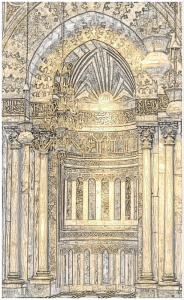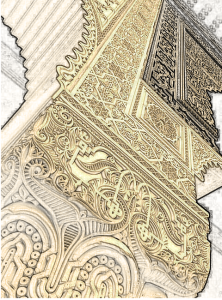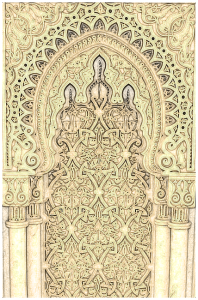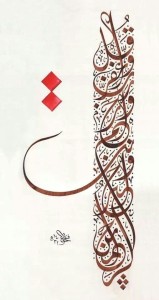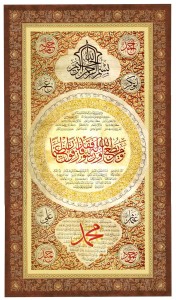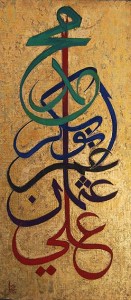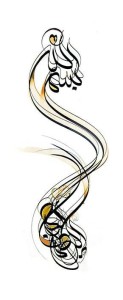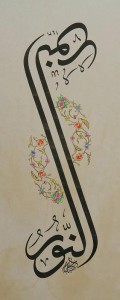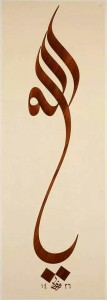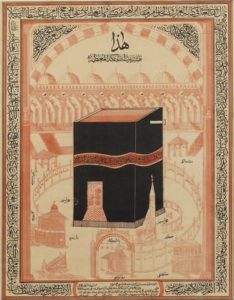All Matter In The Universe Is Held Together By Forces Allah Calls His Hold On Creation
“Allah is the One who holds the heavens and the Earth (the universe), lest they cease to exist. And if they vanished no one could then keep hold of them. Certainly He is Most Forbearing, Ever-Forgiving.”(35:41)
Ibn Umar reported that the Prophet said, ‘Whoever wishes to behold the Resurrection (the end of the universe) as if he were seeing it with his own eyes should read: “When the sun is folded away”
Allah similarly said in the Quran “THEN THE SUN is shrouded in darkness (it’s reaction that create light stop and turns into a black hole, which is how light is shrouded), and when the stars lose their light (do the same as our sun), and when the mountains are made to vanish (as matter falls apart and disintegrates because the forces holing them have ceased to exist), and when she-camels big with young, about to give birth, are left untended, and when all beasts are gathered together, and when the seas are set on fire (as H2O becomes a hydrogen fire fuelled by the oxygen atom), and when all human beings are coupled [with their deeds]”, and when (on the day of resurrection) the girl-child that was buried alive is made to ask for what crime she had been slain, and when the scrolls [of men’s deeds] are unfolded, and when heaven is laid bare (for all to see it’s ghayb, what was once unseen in it), and when the blazing fire [of hell] is kindled bright (in this new creation), and when paradise is brought into view: [on that Day] every human being will come to know what he has prepared [for himself].” (81:1-14)
These verses are speaking of events that will occur when the trumpet is first blown, up to the day of resurrection. When the Trumpet is blown, Allah will stop the forces in the Universe from acting, gravity will no longer exist and the forces that make particles create Atoms weaken and fissile out so that even the strong mountains will vanish as the Atoms they are made from vanish, these forces are the electromagnetic force, the strong nuclear force and weak nuclear force.
The universe will no longer expand or contract by this point in time, the speed at which the universe is moving will stop, and everything in it will be affected by it, so the Sun will become dark because it can no longer create light by it’s a fission reaction, the stars will also do the same, and all will vanish.
As the bonds between molecules and atoms have no effect solid matter will become like dust, and when the seas are set on fire as the bonds between (H2O) hydrogen and oxygen no longer exist, the hydrogen gas will burn as it is fuelled by the oxygen (air).
“and when the heaven is stripped off, torn away from its place, just as the skin of a sheep is stripped off;” (Tafsir al Jalalayn) as it vanishes like the mountains, Allah says about these forces in the universe which will stop working when the trumpet is blown, “Allah keeps a firm hold on the heavens and earth (the particles in them are held together by forces, very literally) preventing them from vanishing away. And if they vanished no one could then keep hold of them. Certainly He is Most Forbearing (this act is a quality of Allah’s forbearance), Ever-Forgiving (placing forgiveness for man in every part of creation, a subtle reference to how forgiveness is tied into creation from the fabric of what it is made of).” (31:45)
As Imam al Ghazali explained this is Allah’s figurative speech in the Quran, Allah doesn’t literally have a hand holding space, the forces of the universe are honoured with being called His hand because of how crucial they are to all life in the universe, and because it is crucial to life and acts as a direct agent of His will when He decrees something, it is given this honorific of being called His hold on creation and His Hand.
In the verse of light (24:35) Allah explains how He is the Light of the heavens and the earth (the Universe) with a simile for how His light exists in the Universe, in the Verse He calls all subatomic particles His light because they represent His complete will by moulding themselves into what He decrees. Just as everything proclaims His will by obeying His command is the meaning of the verse “There is nothing that does not proclaim His Praise (obey’s His will)” (17:46) (Foundations of Islamic Belief, Imam al Ghazali).
The simile Allah gives in the verse of Light is of the Atom and how subatomic particles are created, behaving according to His will and are then used by Allah to guide man in life (this is explained in detail in my book The Light Of Allah In The Heavens and The Earth).
Allah honours these particles by calling them His light in the heavens and the earth because it was from them He created everything as He willed it, in this simile He makes specific mention of these forces calling them the oil of the Lamp (Atom), then in verse 31:45 He mentions how the entire Universe is being held by Him through them because these forces are what keep all Atoms and objects together, even literally saying in the Quran they prevent everything from vanishing away.
As the Quran describes in many verses, everything will disintegrate and turn to “dust” eventually disappearing when the trumpet is blown, because Allah will no longer hold the Universe together meaning the forces will stop existing.
The forces are also likened to His action in creation because they only exist as a result of the expansion of the Universe, and Allah said He is the one expanding it.
“And it is We Who have constructed the heaven (Universe) with might, and verily, it is We Who are steadily expanding it”. (Qur’an, 51:47)
In the verse of Light Allah specifically mentions the forces (oil) are produced by the Universe, so they exist through Him because He is expanding it.
Allah gives another description of the day when the Universe will end, “Assuredly, what ye are promised must come to pass. Then when the stars become dim; and the sky is torn apart; When the mountains are scattered (to the winds) as dust, (70:7-10). This theme of matter coming apart is repeated often in the Quran and is central to Allah’s description of events on that day.


